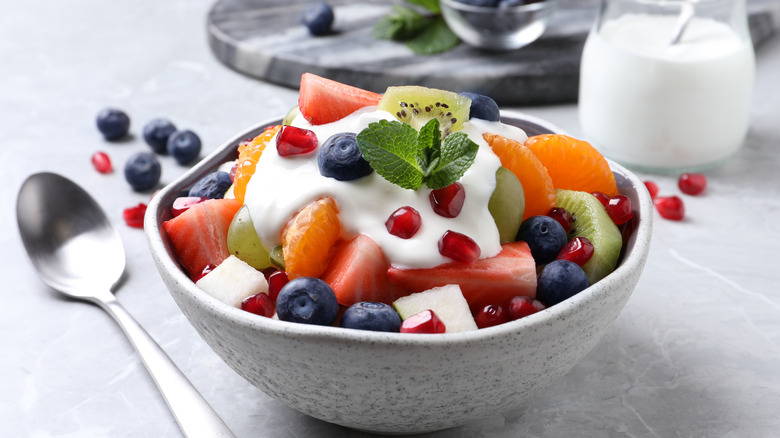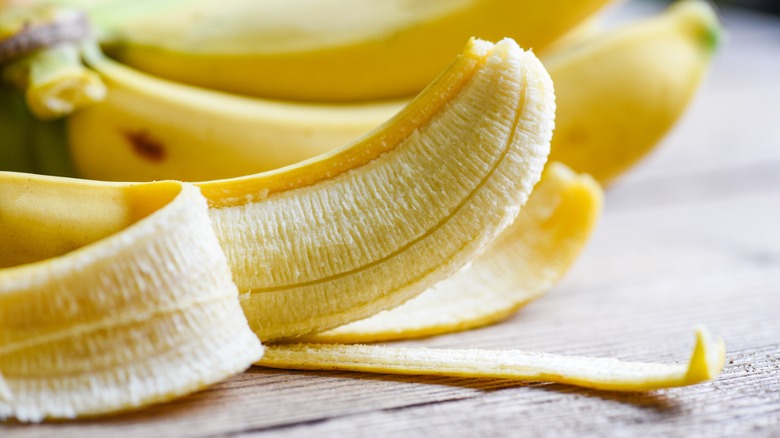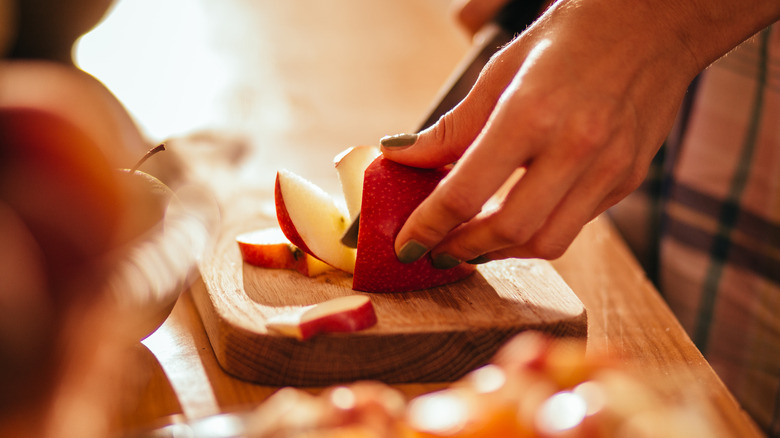The Fruits You Should Avoid When Making Fruit Salad
There is no paragon of fruit salad. While some fruit fanatics approach fruit salad by throwing in their favorite in-season fruits in one bowl, others prefer a mixture of delectable fruits enmeshed in cream cheese and marshmallows. Regardless of the approach, fruit salad is a timeless dessert or snack dish that will brighten any summer day. While there is no singular right way to create a fruity salad, there are a couple of wrong ways: the first of which being including bananas in the mix and the second being including apples.
One of the things to look forward to when taking a bite of fruit salad is a pop of flavor delivered by whichever melon or berry your spoon has captured. These delightful pops of flavor can easily be diminished by the texture of a mushy banana. Even before then, the enthusiasm for eating a refreshing fruit salad can quickly vanish at the sight of a browned apple chunk. For these reasons, bananas and apples are best left out of a fruit salad unless they are properly prepared with a coat of lemon or pineapple juice.
Why bananas turn to mush
The cause of bruising and mushy bananas is one in the same: ethylene. This gaseous fruit hormone is a kick-starter to the ripening process, and bananas are known to contain more of this hormone than most fruits. Ethylene guides bananas through their life cycle, from ripe to rot. As ethylene works its magic, it causes a breakdown of acids that result in the texture changing from firm to mushy.
In addition to being a ripening agent, ethylene is a stress hormone that is produced more when the banana is damaged. From the fruit's perspective, being sliced before being added to a fruit salad is a huge stressor. The increased ethylene leads the banana slices to a mushy end, and takes down other fruits with it.
After a banana is sliced, applying lemon or pineapple juice will save the day by slowing the ethylene reaction. For reinforcements in staving off ethylene reactions, storing bananas in a cool place in an airtight container will help them remain in the Goldilocks zone of ripeness. Even if bananas aren't meant to be in fruit salad, there are still many delicious things you can make with bananas that lean into this fruit's strengths.
How to save apple chunks from browning
Whether it is by slicing the apple up into bite-sized pieces or a strong chomp into the apple itself, when the skin of an apple is damaged, chemical reactions between the flesh and air cause the apple to brown. When exposed to oxygen, an enzyme in the apple's flesh called polyphenol oxidase sets off the enzymatic browning process. The flesh of an apple will brown at different rates depending on the variety of apple because different varieties carry different amounts of this enzyme.
Refrigeration will surely slow the browning process, but a layer of lemon or pineapple juice might even prevent the reaction altogether in addition to slowing it down. If you aren't looking for a tropical or sour accent to the apple chunks, consider using honey water to prevent your apples from browning. Though you typically want to avoid them because of these properties, apples are well worth going this extra mile for if you want them in your fruit salad. Apples provide a unique texture and crunch that pears can't quite mimic; adding them to the mix of an everyday fruit salad just might scratch an itch your taste buds have been nagging about for years.


